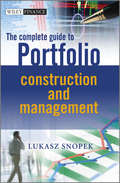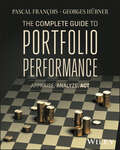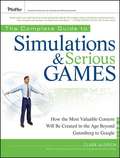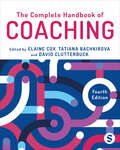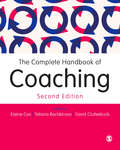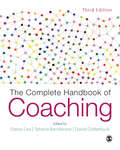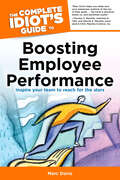- Table View
- List View
The Complete Guide to Physical Security
by Daniel J. Benny Paul R. BakerTo adequately protect an organization, physical security must go beyond the "gates, guns, and guards" mentality that characterizes most security programs. Creating a sound security plan involves understanding not only security requirements but also the dynamics of the marketplace, employee issues, and management goals. The Complete Guide to Physica
The Complete Guide to Planned Giving: Everything You Need to Know to Compete Successfully for Major Gifts
by Debra AshtonThis handbook explains how to set up and run a planned giving program, with emphasis on receiving large contributions from individuals.
The Complete Guide to Portfolio Construction and Management
by Lukasz SnopekIn the wake of the recent financial crisis, many will agree that it is time for a fresh approach to portfolio management. The Complete Guide to Portfolio Construction and Management provides practical investment advice for building a robust, diversified portfolio.Written by a high-profile investment adviser, this book reveals a practical portfolio management framework and new approach to portfolio construction based on four key market forces: macro, fundamental, technical, and behavioural. It is an insight that takes the focus off numbers, looking instead at the role of risk and behavior in finance.As we have seen with the recent finance meltdown, traditional portfolio management techniques are flawed. Investors need to understand those flaws and learn how to incorporate risk management and behavioral finance into their asset management strategies.With a foreword by industry leader Francois-Serge L'habitant, this is your one-stop guide, with new ways for you to manage, grow and preserve your investment portfolio, even in uncertain markets.
The Complete Guide to Portfolio Performance: Appraise, Analyze, Act
by Georges Hübner Pascal FrançoisAn intuitive and effective desk reference for performance measurement in asset and wealth management In The Complete Guide to Portfolio Performance: Appraise, Analyse, Act, a team of finance professors with extended practical experience deliver a hands-on desk reference for asset and wealth managers suitable for everyday use. Intuitively organized and full of concrete examples of the real-world implementation of the concepts discussed within, the book provides a comprehensive coverage of all important portfolio performance matters across 18 chapters of actionable and clearly described content. The authors have provided relevant cross-referencing where appropriate, “Key Takeaways and Equations” sections at the end of each chapter, and pointers to additional resources for anyone interested in pursuing further research. You'll also find: Discussions of more than a hundred classical and modern performance measures organized logically and with a focus on their applications Strategies for selecting appropriate performance measures based on your situation as a manager or investor Explanations of analytical techniques (statistical approaches, attribution, fund ratings...) enabling a comprehensive use of performance-related information Applications of portfolio performance criteria in concrete investment decision-making processes Highly actionable and logically organized material that's easy to find at a moment's notice A full set of pedagogical powerpoint slides and excel worksheets with all data and formulas Perfect for investors, portfolio managers, advisors, analysts, and regulators, The Complete Guide to Portfolio Performance is also a must-read reference for students and practitioners of asset and wealth management, as well as those pursuing certification such as CFA, CIPM, CIIA, and CAIA.
The Complete Guide to Professional Networking
by Simon Ellinas Simon PhillipsNetworking is a skill that many people recognize as critically important, but which many find difficult, boring or fear-inducing - or even all three. Yet if you master the techniques that really work, networking can pay dividends. Effective networking means tapping into a team of like-minded business people willing to help each other achieve their goals. If you build, grow and nurture your business networks, you will become known for your expertise and will be better placed to win the new client, business or job when it really matters. You can network successfully in person or online and The Complete Guide to Professional Networking shows you how to use both together for the most powerful results.The techniques and suggested strategies in this book are backed up by video interviews with some of the world's most successful networking experts.
The Complete Guide to Real Estate Finance for Investment Properties
by Steve BergesThis practical, real-world guide gives investors all the tools they need to make wise decisions when weighing the value and potential of investment properties. Written for old pros as well as novice investors, this friendly, straightforward guide walks readers step by step through every stage of property analysis. Whether you're buying or selling, investing in big commercial properties or single-family rentals, you'll find expert guidance and handy resources on every aspect of real estate finance, including: * Proven, effective valuation techniques * Finance tips for all different kinds of property * How various financing strategies affect investments * Structuring financial instruments, including leverage, debt, equity, and partnerships * Measurements and ratios for investment performance, including capitalization rates and gross rent multiplier ratios * Future and present value analysis * How the appraisal process works * Primary appraisal methods-replacement cost, sales comparison, and income capitalization-and how to know which one to use * How to understand financial statements, including income, balance, and cash flow * Case studies for single-family rentals, multifamily conversions, apartment complexes, and commercial office space * A detailed glossary of important real estate terminology
The Complete Guide to Reverse Mortgages: Turn Your Home Equity into Instant Income!
by Tyler Kraemer Tammy H KraemerGet the most from your home!Until recently, there were only two main ways you could get cash from your home: sell it or borrow against it and make monthly loan repayments. Reverse mortgages offer a third way of getting money from your home. If you are a homeowner, age 62 and older, you are eligible to apply for a reverse mortgage loan that converts your home equity into a tax-free income. With The Complete Guide to Reverse Mortgages, you&’ll learn all you need to know to earn the supplemental income you need, without worrying about: • Having to sell your home • Giving up your title • Taking on a new monthly mortgage payment This invaluable guide explains everything you need to know about reverse mortgages and how to use them to your advantage. With practicing attorneys Tammy Kraemer and Tyler Kraemer leading the way, you will learn the step-by-step process to getting a reverse mortgage and making the best of your retirement!
The Complete Guide to Sales Force Incentive Compensation: How to Design and Implement Plans That Work
by Andris A. Zoltners Prabhakant Sinha Sally E. LorimerIf you’re like most sales leaders, your incentive program is a constant challenge, as you try to jumpstart sales, energize a geographically dispersed and autonomous workforce, and motivate salespeople to achieve ambitious revenue goals. And sometimes it seems like you just don’t know what works; your products and markets are changing, the incentive program that was so successful last year no longer produces the desired results, or perhaps the generous incentive program you created has yielded a corps of highly paid salespeople who spend most of their time on existing clients and minimal time generating new business -- and threaten to walk away with your customer base if you scale back paychecks! Incentive programs are seductively powerful but complicated instruments. Without careful planning and implementation, they can be too stingy to motivate, too complex to understand, too quick to reward mediocre results, and too difficult to implement. But a well-designed and implemented incentive program is an essential tool for building a motivated, highly effective sales force that delivers the results you need. The Complete Guide to Sales Force Incentive Compensation is a practical, accessible, detailed roadmap to building a compensation system that gets it right by creating motivating incentives that produce positive outcomes. Packed with hundreds of real-life examples of what works and what doesn’t, this important guide helps you: Understand the value of building an incentive plan that is aligned with your company’s goals and culture. Avoid the common trap of overusing incentives to solve too many sales management problems. Measure the effectiveness of your current incentive program, employing easy-to-use tools and metrics for pinpointing its weak spots. Design a compensation plan that attracts and retains successful salespeople, including guidelines for determining the correct pay level, the best salary incentive mix, the proper performance measures, and the right performance payout relationship. Select an incentive compensation plan that works for your organization -- then test the plan before it is launched. Set territory-level goals that are fair and realistic, and avoid overpaying the sales force because goals are too easy, or demoralizing salespeople by having goals that are too difficult or not fairly assigned. Create and manage sales contests, SPIFFs (Special Performance Incentive for Field Force), and recognition programs that consistently deliver the intended results. Manage a successful transition to a new compensation plan and build efficient administration systems to support your plan. Every year, corporations spend $200 billion compensating their sales forces, with extremely mixed results. Make sure every dollar you spend is helping to achieve your goal of creating an empowered, effective sales force that drives your company’s success. Packed with ready-to-use formulas and assessment tools and a wealth of insights from frontline sales managers and executives, The Complete Guide to Sales Force Incentive Compensation is your hands-on, easy-to-read playbook for crucially important decisions.
The Complete Guide to Sarbanes-Oxley: Understanding How Sarbanes-Oxley Affects Your Business
by Stephen M. BainbridgeSOX requirements have brought about far-reaching changes for public corporations, private corporations, and nonprofits. Every manager and director should be aware of how the business landscape will be affected, and this is the book you need.
The Complete Guide to Simulations and Serious Games
by Clark Aldrich"Ready to blow your mind? Spend 15 seconds reading Clark Aldrich's The Complete Guide to Simulations and Serious Games. Witty, fast-paced, and non-linear -- it's Spock meets Alton Brown." -- Lynne Kenney, Psy.D., The Family CoachThis exciting work offers designers a new way to see the world, model it, and present it through simulations. A groundbreaking resource, it includes a wealth of new tools and terms and a corresponding style guide to help understand them. The author -- a globally recognized industry guru -- covers topics such as virtual experiences, games, simulations, educational simulations, social impact games, practiceware, game-based learning/digital game based learning, immersive learning, and serious games. This book is the first of its kind to present definitions of more than 600 simulation and game terms, concepts, and constructs.
The Complete Handbook of Coaching
by Elaine Cox Tatiana Bachkirova David ClutterbuckThis fourth edition provides the most comprehensive guide to the field of coaching, exploring a range of coaching theories and approaches, genres and settings and professional issues. It supports trainees and professionals to identify and develop a personal style of coaching. Each chapter includes discussion questions to facilitate reflection on the topic, further reading suggestions and case studies that help trainees make the crucial link between theory and practice. Its three parts cover: The theoretical traditions underpinning coaching such as cognitive-behavioural, gestalt and existential Contexts and genres such as life, executive, peer, team and career coaching Professional issues such as ethics, supervision, continuing professional development, standards and mental-health issues. This Fourth Edition comes with a new chapter on Diversity and Inclusion in Coaching, updated content throughout on cross-cultural coaching and updated Further Reading. A new online Teaching Guide provides chapter teaching and assessment suggestions, videos and further reading to help support trainees’ learning. Thousands of practitioners and trainees across a variety of professions have been helped by this distinctive handbook. From those working in health to education, from business and management to psychology, this unique handbook is an invaluable resource for any coaching career.
The Complete Handbook of Coaching
by Elaine Cox Tatiana Bachkirova David ClutterbuckThis fourth edition provides the most comprehensive guide to the field of coaching, exploring a range of coaching theories and approaches, genres and settings and professional issues. It supports trainees and professionals to identify and develop a personal style of coaching. Each chapter includes discussion questions to facilitate reflection on the topic, further reading suggestions and case studies that help trainees make the crucial link between theory and practice. Its three parts cover: The theoretical traditions underpinning coaching such as cognitive-behavioural, gestalt and existential Contexts and genres such as life, executive, peer, team and career coaching Professional issues such as ethics, supervision, continuing professional development, standards and mental-health issues. This Fourth Edition comes with a new chapter on Diversity and Inclusion in Coaching, updated content throughout on cross-cultural coaching and updated Further Reading. A new online Teaching Guide provides chapter teaching and assessment suggestions, videos and further reading to help support trainees’ learning. Thousands of practitioners and trainees across a variety of professions have been helped by this distinctive handbook. From those working in health to education, from business and management to psychology, this unique handbook is an invaluable resource for any coaching career.
The Complete Handbook of Coaching
by Elaine Cox Tatiana Bachkirova Dr David A. ClutterbuckThis second edition provides the most comprehensive guide to the field of coaching, exploring a range of coaching theories and approaches, genres and settings, and professional issues. It supports trainees and professionals to identify and develop a personal style of coaching. Its three parts cover: The theoretical traditions underpinning coaching such as cognitive-behavioural, Gestalt and existential Contexts and genres such as life, executive, peer, team and career coaching Professional issues such as ethics, supervision, continuing professional development, standards and mental-health issues. Written by leading international authors, each chapter makes links between theory and practice and includes discussion questions to facilitate reflection on the topic, further reading suggestions, and case studies. This new edition includes completely revised and updated chapters throughout, an additional emphasis on cross-cultural coaching and new chapters on Health and Wellness Coaching and Researching Coaching. The handbook is a unique resource that has helped thousands of practitioners and trainees from a variety of professions and multi-disciplinary backgrounds, including health, education, business and management and psychology, throughout their coaching career.
The Complete Handbook of Coaching
by Elaine Cox Tatiana Bachkirova Professor David Ashley ClutterbuckThis book provides a wide-ranging guide to the complex, multidisciplinary area of coaching, helping trainees to find comprehensive answers to their coaching questions. It allows them to identify and develop their own personal style of coaching. A specially selected group of international authors contribute various expertise and insights across three key areas: Theoretical perspectives Contexts and genres of coaching Professional practice Issues Learning is also supported by new online resources. Videos, case studies, journal articles and useful websites have been carefully collated by our contributors to help trainees make the crucial link between theory and practice.
The Complete Handbook of Coaching
by Elaine Cox Tatiana Bachkirova Professor David Ashley ClutterbuckThis book provides a wide-ranging guide to the complex, multidisciplinary area of coaching, helping trainees to find comprehensive answers to their coaching questions. It allows them to identify and develop their own personal style of coaching. A specially selected group of international authors contribute various expertise and insights across three key areas: Theoretical perspectives Contexts and genres of coaching Professional practice Issues Learning is also supported by new online resources. Videos, case studies, journal articles and useful websites have been carefully collated by our contributors to help trainees make the crucial link between theory and practice.
The Complete Idiot's Concise Guide to Getting Out of Debt
by Ken ClarkLearn great tips on how to get out debt as well as the financial pitfalls that lead to such issues.
The Complete Idiot's Guide to Accounting, 3rd Edition: The Only Book You Need to Balance Your Books!
by Lita Epstein Shellie MooreThe art of accounting-by the numbers. The Complete Idiot's Guide® to Accounting, Third Edition takes the guess work out of this basic business activity. This updated edition has all the current information any business person will need to understand the "books," along with a useful workbook style appendix to re-enforce the lessons learned throughout the book. • Fully updated including all new forms • New workbook appendix with dozens of useful exercises • Up-to-date information on the changes in payroll taxes, including the new Medicare tax
The Complete Idiot's Guide to Active Trading: Turn High Volume into Cash in Today’s Market
by Ken LittleThe smart way to succeed in electronic trading. There is money to be made in active electronic trading, if investors know the rules of the game and the right investing strategies. This guide includes all the information nonprofessional traders need to be successful at day trading stocks in today&’s market, with tips and up–to–the–minute information on the newest technologies, the amazing opportunities in both American and international markets, and strategies for how to profit from them. • Most current day trading guide available • Up–to–date screen captures of dozens of actual trading scenarios • The newest information sites and technologies • Full glossary of trading terms
The Complete Idiot's Guide to Barter and Trade Exchanges
by Jerry Howell Tom ChmielewskiHow many haircuts is that tune-up worth? With money tight, bartering is growing in popularity. Over 70,000 businesses make cashless transactions throughout America. Here is the only complete, step-by-step guide to how this potentially lucrative process works, including: • The advantages of direct versus national barter networks• How to save and increase profitability• How to increase sales and revenue• How to start a trade exchange. • From a national expert and bareter entrepreneur • Detailed resource section exchanges and business associations
The Complete Idiot's Guide to Best Practices for Small Business
by Brandon Toropov Gina Abudi• Illustrates how to make money and keep it with time-honored strategies • Insightful real-life anecdotes to illustrate key concepts
The Complete Idiot's Guide to Boosting Employee Performance
by Susan Shelly Marc DorioKeep workers working—and happy. The Complete Idiot's Guide® to Boosting Employee Performance is the most current and comprehensive guide for managers seeking to get the most out of their employees and build lasting relationships that will help them grow their business. Includes the newest and most powerful tools to keep employees doing their best, including ideas on keeping morale high when business is tough, avoiding stagnant work habits and routines, energizing employees about their job, how to retain the best employees, and much more. • Practical tips on maintaining clear communication between managers and staff, offering the right incentives, and inspiring teamwork • Includes insightful anecdotes from real life
The Complete Idiot's Guide to Branding Yourself: Tips and Techniques for Showing Who You Are and What You Can Do
by Ray Paprocki Sherry Beck PaprockiA brand new look at a time-tested business practice Using powerful techniques refined in the heat of business competition, this book guides readers in defining and building a personal brand that is distinctive, relevant, and consistent. It includes: • An in-depth understanding of the principles of successful brand building-in any context • Practical tools to build and manage powerful relationships • Strategies for aligning personal brand values with an employer's brand values, and making brand-building a successful endeavor for both • Advanced techniques to continually refine your unique personal brand
The Complete Idiot's Guide to Business Law: A Plain English Primer with All the Basic and More
by Cara C. PutmanThe only guide of its kind! Undergraduate college students working toward business degrees, MBA graduate students, and first year law students have one thing in common: they need to take courses in business law. Unlike cumbersome and expensive textbooks, The Complete Idiot's Guide® to Business Law is the first and only series guide that explains the major principles, phrases, and real life implications of business law for students and interested professionals.• Discusses only relevant case laws to the topics• Fully explains key words, phrases, and concept• Contains clear and jargon-free explanations and definitions• Includes narrative examples to illustrate situations and concepts
The Complete Idiot's Guide to Business Plans, 2nd Edition: Start and Sustain Your Business with a Foolproof Plan
by Sue Johnson Gwen MoranIt's just good business. The Complete Idiot's Guide® to Business Plans, Second Edition, helps new and existing entrepreneurs create clear, comprehensive, and compelling business plans by walking them through all of the decisions they'll need to make before writing their plans, and then helping them structure and execute their plans to achieve their specific business goals. • According to the Small Business Administration, in 2002 approximately 570,000 new small businesses opened their doors for business, and in 2007, the number rose to 680,000. Data shows that the past three recessions all resulted in significant rises in the number of new small businesses • More than 75 percent of small firms use some form of credit in their startup or operations
The Complete Idiot's Guide to Buying a Home: An Easy-to-Follow Road Map to Your Dream Home
by Peter RichmondIn real estate, it's a buyer's market—and here is the buyer's bible . . . Buying a home is the single most important financial move in most people's lives. This book covers a variety of topics including inspecting, evaluating, negotiating, financing, contracts, and legal issues. It also breaks down the roles of the key players and what these professionals, agents, brokers, and inspectors are responsible for—and when to go it alone. The thorough advice, covering everything from buying houses at auctions to what neighborhood to live in, will provide reassurance for every soon–to–be homeowner. • A necessary tool for those who plan to buy homes and even current homeowners in order to keep up with an ever changing market • Will be published in time for spring, when most people start looking into buying new homes • Covers a broad range of buying options and homeowner's needs


